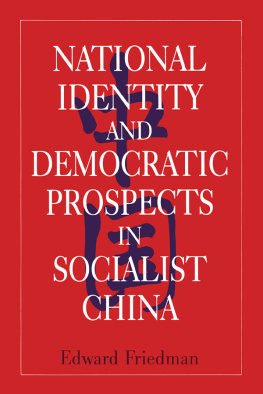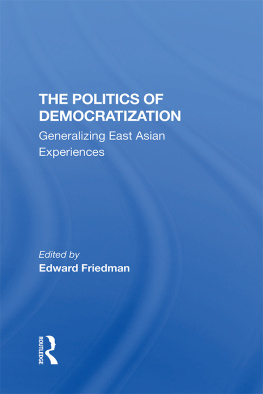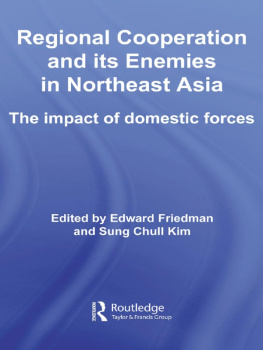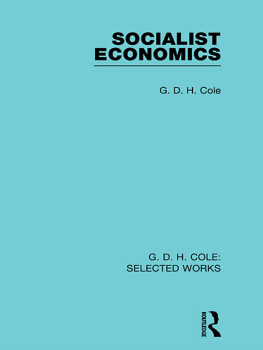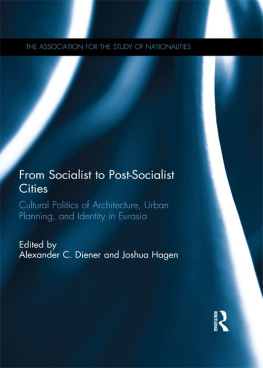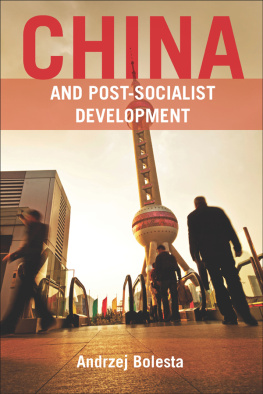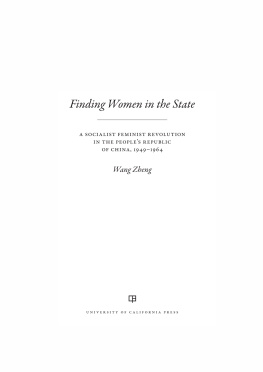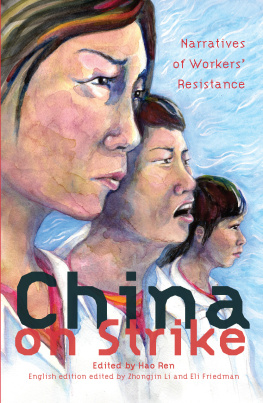NATIONAL
IDENTITY
AND
DEMOCRATIC
PROSPECTS
IN
SOCIALIST
CHINA
National Identity and Democratic Prospects in Socialist China is a challenging contribution to the debate about democratic prospects in China which vividly captures the contradictory cultural forces that have emerged with the crisis of national identity in the reform era.
Frank Diktter,
School of Oriental and Africa Studies,
University of London
This engaging collection of essays by Edward Friedman pursues the closely related themes that have defined his scholarship in recent years: democracy, the debilities of Leninism, the demise of the cultural mythology of a single Han people. Friedman has a keen sense of history, acute enough to forsake prophecy, but to read carefully the powerful trends that interrogate the destiny of China. Can an indispensable democratization create a new political order which accommodates competing narratives of China's origins and cultural essence? Only the future will reveal the answer, but these insightful essays raise the key questions.
M. Crawford Young,
University of Wisconsin, Madison
NATIONAL
IDENTITY
AND
DEMOCRATIC
PROSPECTS
IN
SOCIALIST
CHINA
Edward Friedman
First published 1995 by M.E. Sharpe
Published 2015 by Routledge
2 Park Square, Milton Park, Abingdon, Oxon OX14 4RN
711 Third Avenue, New York, NY 10017, USA
Routledge is an imprint of the Taylor & Francis Group, an informa business
Copyright 1995 Taylor & Francis. All rights reserved.
No part of this book may be reprinted or reproduced or utilised in any form or by any electronic, mechanical, or other means, now known or hereafter invented, including photocopying and recording, or in any information storage or retrieval system, without permission in writing from the publishers.
Notices
No responsibility is assumed by the publisher for any injury and/or damage to persons or property as a matter of products liability, negligence or otherwise, or from any use of operation of any methods, products, instructions or ideas contained in the material herein.
Practitioners and researchers must always rely on their own experience and knowledge in evaluating and using any information, methods, compounds, or experiments described herein. In using such information or methods they should be mindful of their own safety and the safety of others, including parties for whom they have a professional responsibility.
Product or corporate names may be trademarks or registered trademarks, and are used only for identification and explanation without intent to infringe.
Library of Congress Cataloging-in-Publication Data
Friedman, Edward.
National identity and democratic prospects in socialist China /Edward Friedman.
p. cm.
Includes bibliographical references and index.
ISBN 1-56324-433-0. ISBN 1-56324-434-9 (pbk.)
1. ChinaPolitics and government1076- . I. Title.
DS779.26.F75 1995
951.05dc20 94-42257
CIP
ISBN 13: 9781563244346 (pbk)
ISBN 13: 9781563244339 (hbk)
For
Helen Marcus Friedman, Anne Thompson Stanford, Susan Stanford Friedman, Ruth Jennifer Friedman, Joanna Stanford Friedman
Contents
In the post-Mao era of deep involvement with the world economy, and in an era when Maos legitimation of the Peoples Republic in terms of militarized, antiimperialist self-reliance makes no sense to the Chinese people, is there a glue of common values or goals or a worldview that holds the Chinese people together as one nation? If not, how long can that dictatorial, overly centralized regime survive? If not long, what is likely to replace it?
These crucial questions have informed my research agenda since 198788. This book offers tentative answers to these vital questions, answers that challenged the conventional wisdom of 1988 that did not grapple with socialist Chinas deepening crisis of national identity and thereby obscured important forces of division, chaos, or civil war, or perhaps confederation, federation, or democracy.
In addition to identifying forces and dynamics that could take China in the twenty-first century on a political path of democracy, this book tries to contribute to the ongoing debate among analysts of nationalism, especially by adding to the discussion about what makes for a democratic national identity. In the early 1990s, ever more theorists found wisdom in deep structural approaches that located distant turning points at which the possibility for democracy was won or defeated ever further back in time. In contrast, this study stresses the centrality of political creativity at reappearing, albeit not continuous or numerous, moments of political opportunity.
In the wisdom of a deep structuralist, on the other hand, Chinas loss of democratic possibility can be located half a millennia ago, when the early-modern military revolution in all the East failed to produce a democratic potential that allegedly developed uniquely in the West. In the East, instead, we have found powerful central states unencumbered by estates, legal necessities or local centers of power.1
In sharp contrast, this study is based on the fact that all societies are capable of a politics of successful democratization. This is obviously so in the East, where Japan, South Korea, Taiwan, and Mongolia have already democratized. A serious comparative political sociology would show that these Asian societies have long had at least as much cultural and social potential for democracy as the West.2
Still, this book accepts a central premise of the cultural structuralists, that is, that the cultural construction of a national identity compatible with democracy is indeed crucial to democratic consolidation. This study details the construction of a democratic national identity in China. Thus, in contrast to the conventional wisdom that distinguishes East and West as two absolutely opposed worlds, this analysis is premised on the finding that what is decisive in any society is a politics of democratization in which contested national identities vie as projects of diverse political coalitions. In other words, constitution making alone will be a weak reed against hurricane-force antidemocratic gales unless key strata stand firmly with that constitution and can construct a political edifice of democratic inertia where the larger purpose of a solid and broad-based democratic politics prevents the toppling of democracy because the constitutional order is at one with a deeply rooted popular democratic nationalism.3 This work tries to capture the cultural construction of that democratic nationalism in late-twentieth-century China.4 Much scholarship already details how in the Taisho era in Japan, as in the May Fourth era in China, crucial groups have promoted democracy in opposition to despised tyrannies. Indeed, once the institutional realities of building democracy were known, it was inevitable that key strata and interests would embrace democracy to discredit despotism. The promotion of a democratic project in China therefore was to be expected.
The beginning of the twenty-first century will be marked by the rise of East Asia; it is therefore extraordinary how much scholarly work is still premised on a long-discredited Eurocentric othering that distinguishes the good West from all the bad rest, with western nationalism as relatively benign and nice, and the eastern kind as nasty, and doomed to nastiness by the conditions which gave rise to it.5 In line with the influential writings of Harvard University professor Samuel Huntington, the profound structural inquiry of




